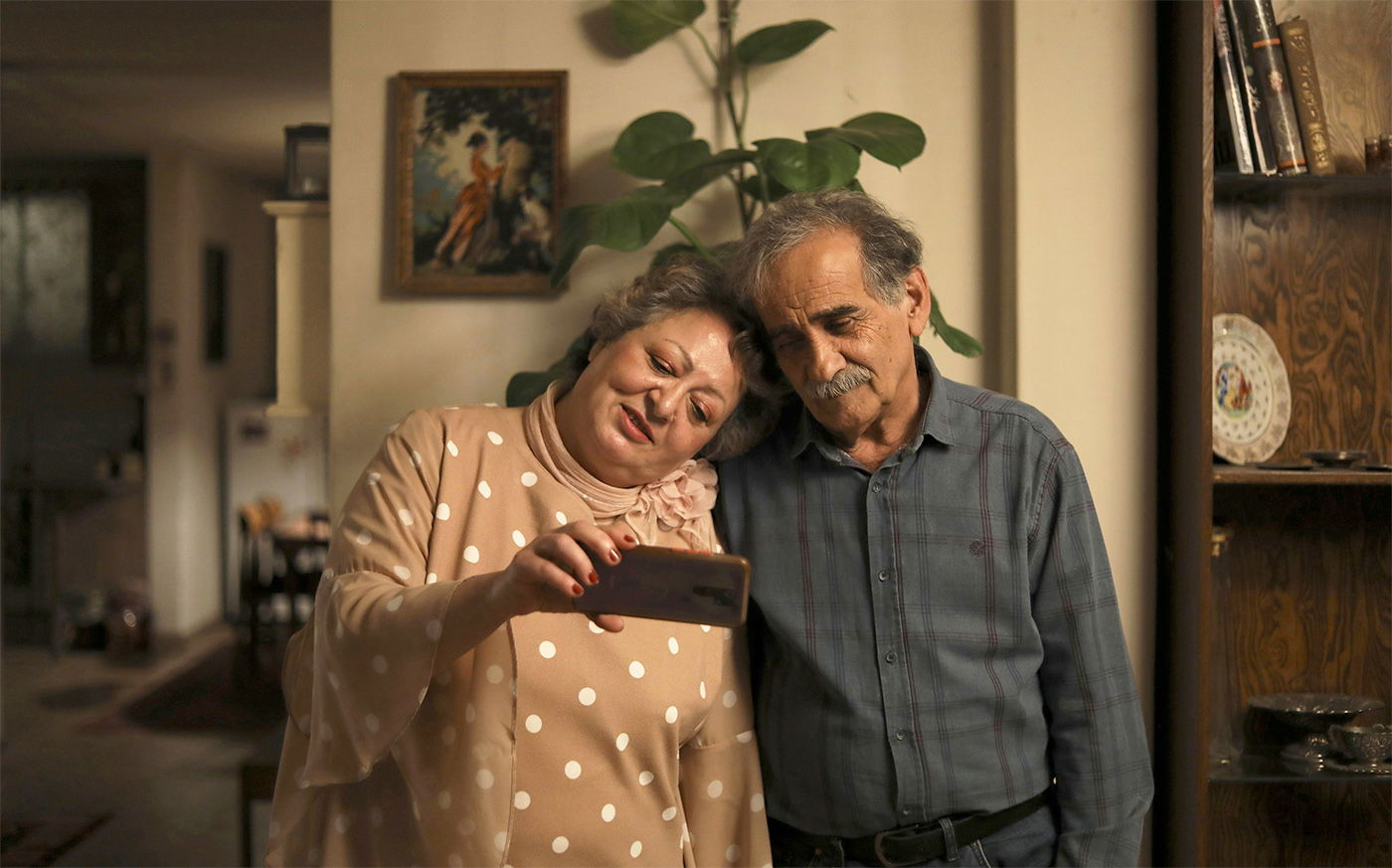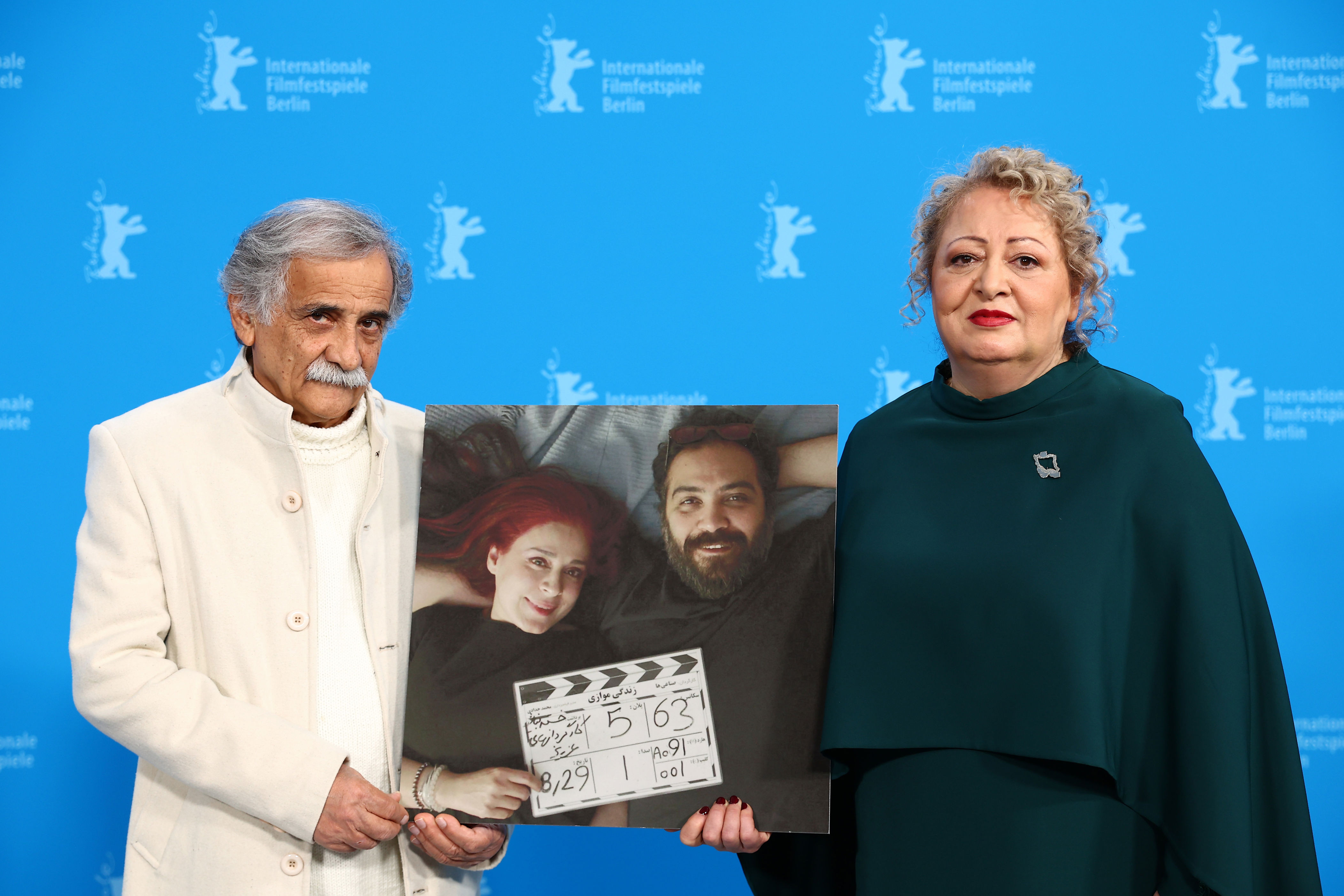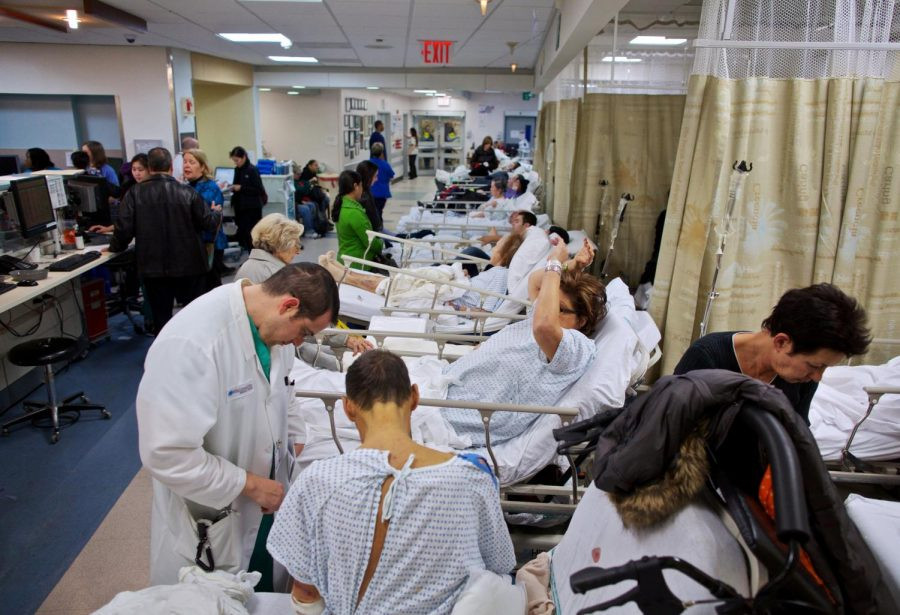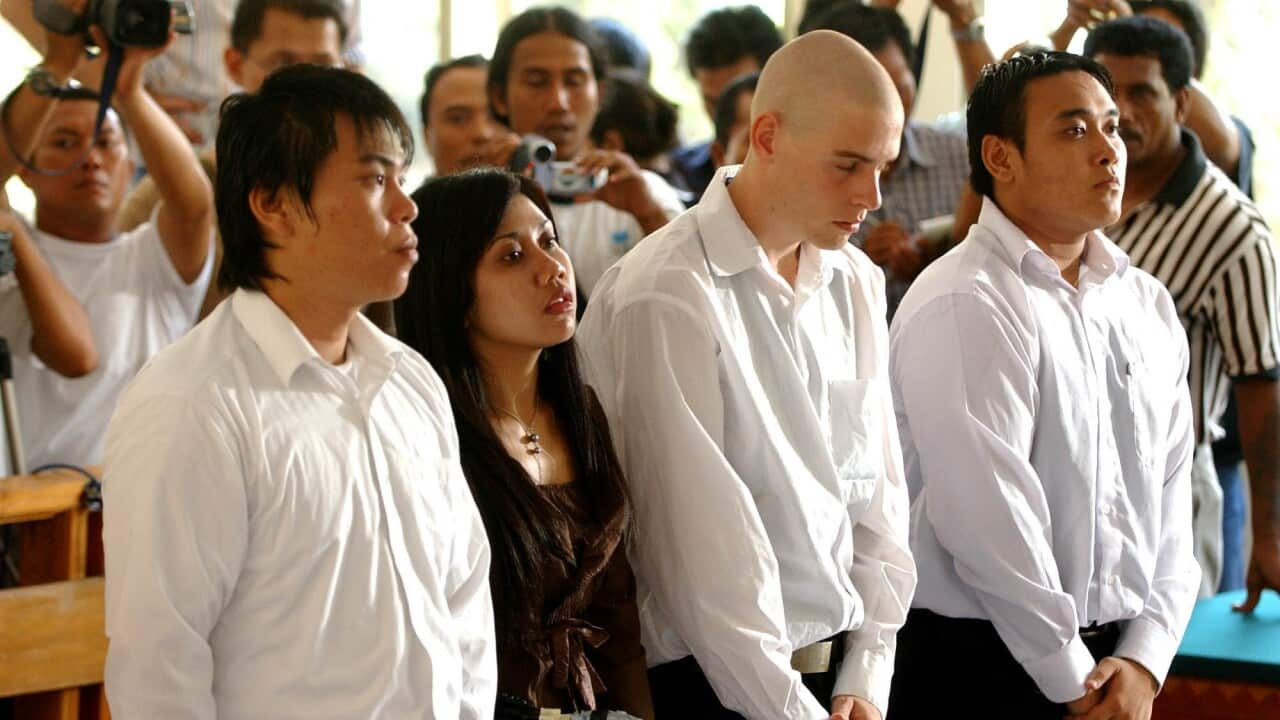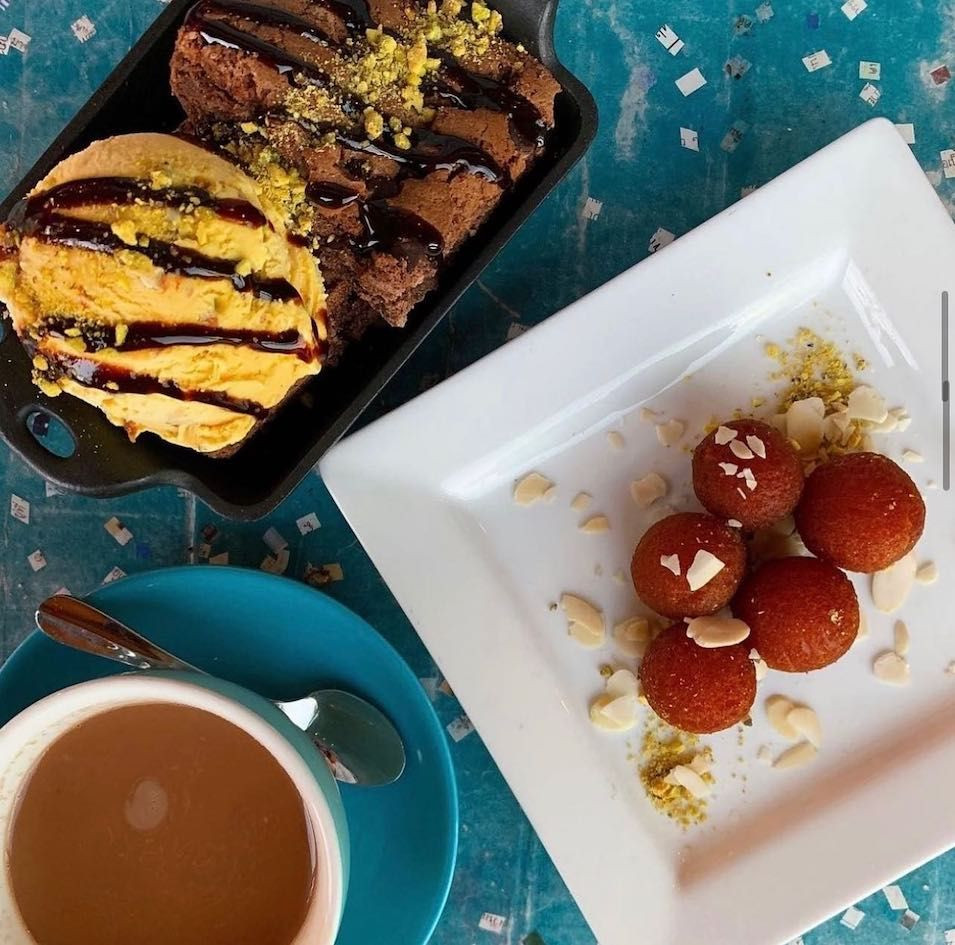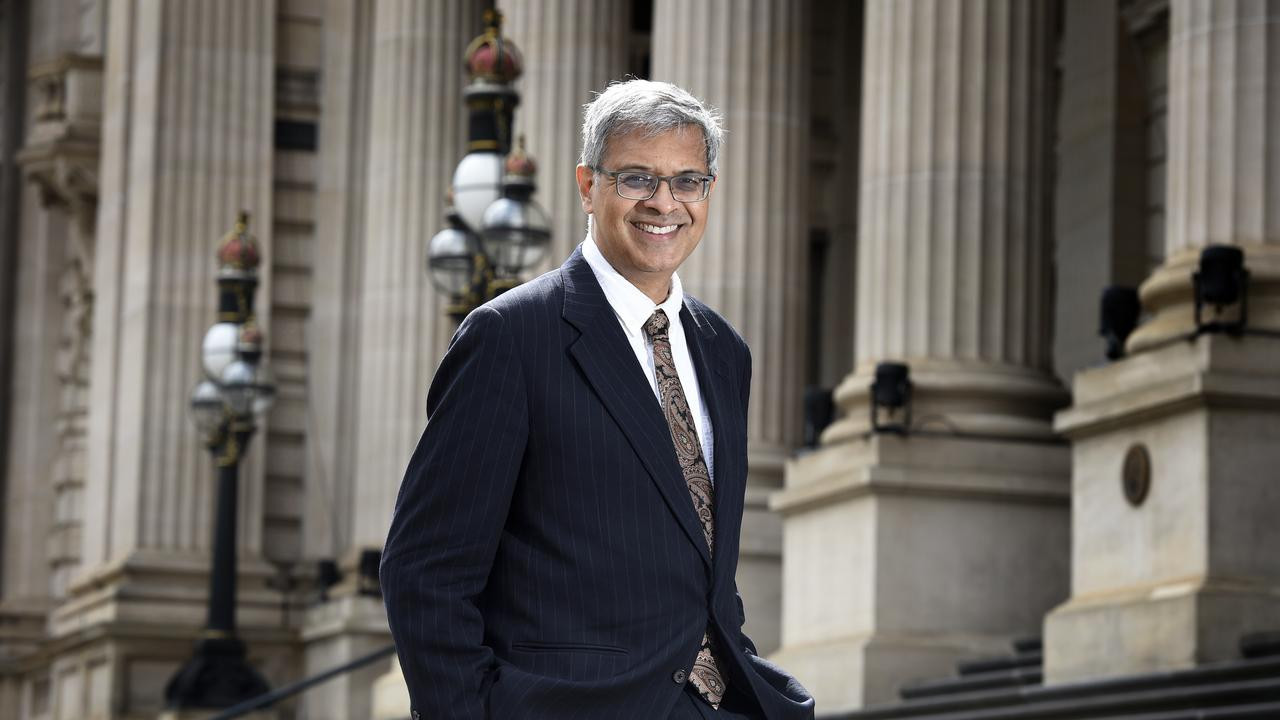A 70-year-old widow in Tehran shakes up her predictable existence when she pursues a relationship with a lonely taxi driver in Maryam Moghaddam and Behtash Sanaeeha’s defiant late-in-life romance.
After a long day, 70-year-old Mahin (Lily Farhadpour) is getting ready for bed. Preparing to brush her teeth, she appraises herself in the mirror. Squinting, she smudges turquoise eyeshadow over her eyelids. Better? Not quite. Sighing, she dots lipstick on to her cheekbones, rubbing it in with the back of her hands, and applying the coral to her lips. Her expression is sceptical, and then defeated. She retreats to the sofa, passing out in front of the TV.
What’s even more subversive, however, is Mahin’s sense of agency. Moghaddam and Sanaeeha frequently depict her alone at the centre of the frame, whether enjoying an affogato in a posh hotel lobby, waiting for a cab outside the market, or sitting at a park bench overlooking the city. In each setting, Mahin’s independence is presented as a fact rather than pitied.
Mahin's Awakening
A middle-class widow in Tehran who has spent the last 30 years single, Mahin’s day-to-day involves waking up at noon, watering her plants and throwing dinner parties for her girlfriends (“the old gals”). In the evenings, she watches romantic dramas and knits. As her friends tell her, over platters of watermelon, no man means no man to look after: it’s not a bad life. But it’s not an exciting one either, as Mahin flies under the radar, avoiding the watchful gaze of both the morality police and her neighbours.
Maryam Moghaddam and Behtash Sanaeeha’s gentle romantic comedy dares to ask if Mahin actually wants to move through life unnoticed. Frustration flashes across Farhadpour’s expressive face as her grown-up daughter tells her to wear her nice clothes “at home”. It’s a far cry from the plunging necklines and sky-high heels of her youth, which she describes nostalgically to a local cab driver. Mahin is wistful for an out-of-reach sexuality, knowing that it is also out of bounds. At the local bakery, she attempts to flirt with a stranger, moving in just that little bit too close.
Breaking Free
She’s dismissed as a cuddly grandma, even as she muscles in to protect two young women in hijabs from a police officer. “You’d kill them over a few strands of hair?” she growls, as the young women cower, heavy fringe and pink hair peeking out from underneath their headscarves. Afterwards, one of the girls remarks that at Mahin’s age, that kind of sexism “doesn’t really affect you”.
Keenly aware of her dwindling sexual capital, and no longer accepting of it, Mahin takes herself to a pensioners’ cafe for lunch. It’s there she encounters taxi driver Faramarz (Esmaeil Mehrabi). When she overhears that he’s single and lives alone, she books a cab ride home with him, and strikes up a conversation. Emboldened by the pathetic fallacy (outside, summer rain pours) and Faramarz’s open, affable demeanour, Mahin invites him back to her place, where a romantic evening unfolds.
The Power of Love and Freedom
The film keeps pace with their date, Before Sunrise style, camera tightening as the conversation becomes more intimate. It’s only at this point – halfway through the film – that the couple reveal their ages. Possibly, Moghaddam and Sanaeeha withhold this fact in order to encourage audiences to work out how old they think these characters are. The divorced, twinkly-eyed Faramarz praises Mahin’s gumption, telling he knows that “women can propose too”. Over booze and peaches, Mahin begins to glow. They vow to make wine together, “like lovers do,” take selfies and dance, as the camera rotates around them. There is the sense that there is no more time to waste.
A Glimpse of Forbidden Desire
Too often, later-in-life romances are presented as ‘cute’, neutered, shorn of sexual desire; here that desire is suggested, rather than shown. A scene in which the couple take a shower fully clothed risks reading as twee but in the event is simply tender, as they vulnerably acknowledge their long bouts of celibacy. There’s sensuality to be found elsewhere anyway, in Mahin’s night-blooming jasmine, and the promise of an orange blossom cake.
A Bold Choice: Defying Social Norms
The film’s downbeat final stretch feels especially harsh, then, as Moghaddam and Sanaeeha burst their protagonist’s bubble.
A moving tale of nascent romance between two kindly septuagenarians has been enough, apparently, to send the Iranian government into a tailspin. Only this week the passports of the married film-makers Maryam Moghaddam and Behtash Sanaeeha were confiscated and they were banned from travel when they tried to fly to Sweden to attend the movie’s premiere. And why is the film so dangerous? What is the politically explosive material contained within?
It’s about a 70-year-old Iranian woman called Mahin (Lily Farhadpour, riveting), widowed and lonely in suburban Tehran, who spends aimless days gardening and baking, and passes sleepless nights wistfully watching soapy melodramas on TV. Pretty seditious so far, right?
Mahin, however, remains devoted to the possibility of romance and strikes up an impulsive friendship with the equally lonely taxi driver Faramarz (Esmail Mehrabi, quietly commanding). And so, on a dark and rainy night, the pair retire covertly to Mahin’s apartment, where they drink forbidden wine, listen to “un-Islamic” music and, eventually, dance together softly around the sitting room. This central relationship, swiftly established yet deeply felt, is played by our leads with sharp comic timing and some of the easygoing intimacy that Michael Caine and Glenda Jackson brought to The Great Escaper. There’s a final reel twist that’s almost tacky but is ultimately saved by its relevance to Mahin’s journey of self-acceptance.
A Symbol of Resistance
And so, to repeat, why has the film riled the Iranian regime? Possibly because of a scene in which Mahin rebukes the morality police for arresting young women over incorrect hijab usage. Or maybe because of the boozing. It’s more likely that the subversive tone is problematic, as is the foregrounding of two central characters who remember a pre-Revolution Iran, and who ultimately dream of a country where carousing and careless romancing could be met with giddy approval from all instead of instant censure from a handful of joyless bigots.
'My Favourite Cake' is a testament to the enduring power of love and the human spirit's ability to find joy and connection even in the face of adversity. This film, despite its simple premise, is a powerful statement about freedom, individual choice, and the importance of living life on one's own terms, even when those terms challenge societal norms.
This poignant and humorous film showcases the beauty of human connection and the resilience of the spirit, leaving audiences with a lingering sense of hope and the desire to embrace life with all its complexities.




